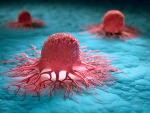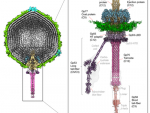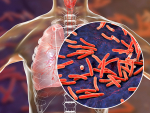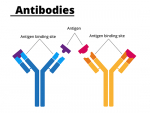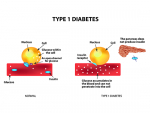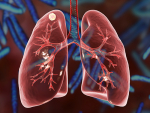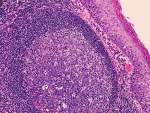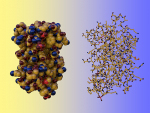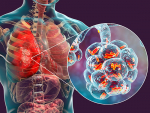Displaying items by tag: department of microbiology
The regulator HIF1α functions in a cancer-microenvironment that lacks oxygen, and it may be involved in resistance to immune checkpoint blockade therapy.
Tagged under
Michael Niederweis, Ph.D., and Cynthia Owsley, Ph.D., who collectively hold 23 patents, have been recognized for approaches to DNA sequencing and detection of impaired dark adaptation, respectively.
Tagged under
There are no effective antivirals against BK polyomavirus in transplanted kidneys. A better understanding of its replication will offer new ways to protect those kidneys.
Tagged under
A UAB gut health researcher shares five tips to help you maintain a healthy gut while enjoying holiday meals and treats.
Tagged under
Bacterial viruses, known as phages, are the most abundant biological entities on the planet and are increasingly used as biomedicines to eradicate antibiotic-resistant pathogenic bacteria.
Tagged under
Goal of this UAB-led service is transforming the global landscape of TB research through accelerated study of human TB tissue.
Tagged under
Indirect benefits could include how to lessen rejection of transplanted organs and damage to the transplanted tissue.
Tagged under
Cooper recently won the Albert Lasker Award, known as “America’s Nobel Prize,” given to the living person considered to have made the greatest contribution to medical science.
Tagged under
Lund is the fifth Distinguished Fellow from UAB named since 2019, a sign of the strength of immunology research at UAB.
The site-directed addition of a polymer on the antibody trastuzumab helped this cancer-fighting antibody cross the blood-brain barrier.
Tagged under
Vaccination of neonatal mice with group A Streptococcus promotes clonal expansion of B cells that produce antibody against GlcNAc. The association of reduced Type 1 diabetes risk after group A Streptococcus infection is dependent on these GlcNAc-specific B cells.
Tuberculosis, the world’s leading infectious disease killer, caused 1.6 million deaths in 2021, along with 10 million new cases of tuberculosis every year.
Tagged under
The Blazer Bridge Fund is intended to identify and assist in the development of promising ideas, discoveries, innovations and/or technologies from UAB faculty and staff that have commercial potential.
Tagged under
- release
- harbert institute for innovation and entrepreneurship
- school of education
- school of engineering
- school of medicine
- department of otolaryngology
- department of anesthesiology and perioperative medicine
- department of microbiology
- department of medicine
- division of hematology and oncology
- division of pulmonary allergy and critical care medicine
- division of gerontology geriatrics and palliative care
Lung-resident memory B cells produced during influenza are long-living immune cells that migrate to the lungs from draining lymph nodes and lie in wait as early responders that can quickly react to future infections. They are key sentinels against subsequent viral variants.
Tagged under
This is the first direct evidence that resident microbiota can have a significant impact on the establishment and pathology of infection by two different human-specific pathogens.
Tagged under
Some PD-1+CXCR5+CD4+ T cells will become germinal center-Tfh cells that are essential for B cells to become high-affinity antibody-producing cells. Others do not take that path, instead becoming memory T cells.
Tagged under
Periodontal disease is one of the leading causes of tooth loss in adults and may be a risk factor in the development of Alzheimer’s disease.
Tagged under
Knowledge of this previously unrecognized mechanism may aid therapy for patients with interleukin-6 signaling mutations and hyper-IgE Syndrome, or HIES.
Tagged under
Researchers identify a new target to fight infections caused by the opportunistic lung pathogen Streptococcus pneumoniae — interference with the bacteria’s fermentation metabolism.
Tagged under
These effector memory B cells appear poised for a rapid serum antibody response upon secondary challenge one year later, and evidence shows that the cells in this subset differ from all previously described memory B cell subsets.
Tagged under
- center for clinical and translational science
- release
- school of medicine
- department of microbiology
- department of medicine
- division of infectious diseases
- division of clinical immunology and rheumatology
- department of biomedical informatics and data science
- center for clinical and translational science
